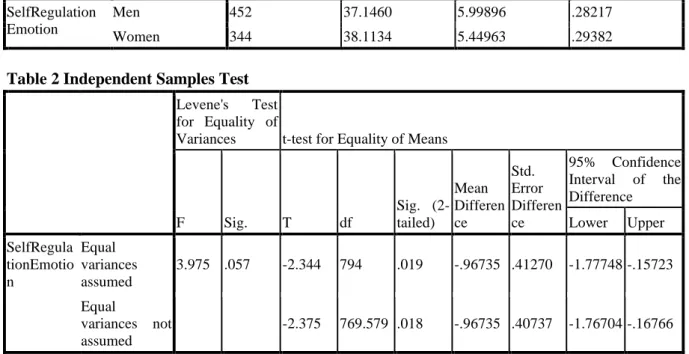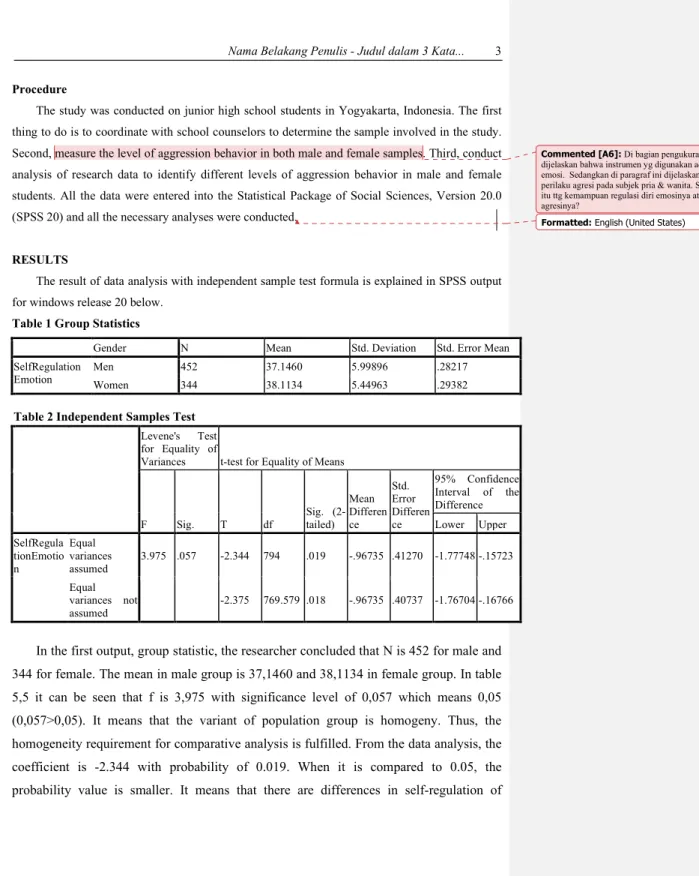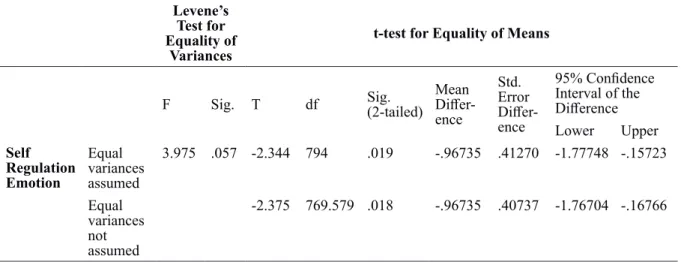Abstract: The purpose of this study was to identify whether there are differences in self-regulation of emotional skills in male and female students. Data analysis used to identify differences in self-regulation of emotional skills in male and female students is independent sample test. The results of the study indicate that there is a significant difference between male and female students' self-regulation of emotional skills.
Abstract: The purpose of this study was to identify whether there are differences in the self-regulation of emotional skills of male and female students. This research aims to identify the difference of emotion skill self-regulation between male and female students. This research is a comparative research whose objective is to compare the level of self-regulation of emotion ability between male and female students.
The tool used in this study is emotion scale self-regulation with indicators of cognitive reappraisal and expressive suppression. The aim of this analysis is to identify the difference in the level of self-regulation of emotion ability between male and female students. Based on the group average, female students possess higher and better self-regulation of emotion capacity than male students.

CONCLUTION
The increase in aggression behavior will also cause the emergence of negative perception about school environment. Therefore, special attention comes from many stakeholders as a response of aggression behavior and students' inability to control their emotion. A research has shown that a good perception can bring positive influence on students' academic performance (Urick & Bowers, 2014). Student's negative perception towards their environment (when intimidation, bullying and violence takes place) affects students' academic performance and their well-being (Kutsyuruba, Klinger, &Hussain, 2015).
School climate is an important factor when the student can feel saved, connected and supported by either friends or teachers. It then protects their mental and emotional health to achieve the best in school (Lester & Cross, 2015). The above explanation becomes an important thing for all stakeholders who are responsible for designing the best school program to create conducive climate.
Thus, students' well-being in their daily activities can be well actualized and maximized for their academic success.
REFFERENCES
Relationships between school climate, school safety, and student achievement and well-being: A review of the literature. The relationship between school climate and mental and emotional well-being at the transition from primary to secondary school. Adolescent involvement in bullying and perceived family, peer, and school relationships: Commonalities and differences by race/ethnicity.
Age and gender differences in emotion regulation strategies: Autobiographical memory, rumination, problem solving, and distraction. The impact of principal perception on academic climate and student achievement in high school: How it is measured.
JKBK] Editor Decision
Oleh Said Alhadi, Wahyu Nanda Eka Saputra, Purwadi Purwadi, Siti Muyana, Agus Supriyanto, Dwi Fatmawati. KATA KUNCI prokrastinasi akademik, bimbingan dan konseling, bullying, konseling, creative problem solving, self-efficacy, konseling kelompok, bimbingan dan konseling SMP.
Self-Regulation of Emotion of Students in Yogyakarta Indonesia: Gender Differences
Self-regulation of emotions actually plays a vital role in increasing student success, but it is an equally difficult skill to master. The instrument used in this research is the self-regulation of emotions scale with indicators of cognitive reappraisal and expressive suppression. The implementation of the self-regulation of emotions scale is equally adapted to the psychological development of secondary school students.
Third, conduct analysis of research data to identify different levels of aggression behavior in male and female students. In the first output, group statistics, the researcher concluded that N is 452 for males and 344 for females. The previous research suggested that men have better ability to control their emotions than women (Trives, Bravo, Postigo, Segura, & Watkins, 2016).
It is believed that men have more maturity to control their emotions than women when they are in a difficult situation. According to the above research, it shows that emotion management is an important element that can help control student's aggression behavior. It has been proven that the better one's emotion management is, the lower aggression behavior will be.
They are emotional awareness, acceptance, and strategies to control emotions (Roberton, Daffern, & Bucks, 2012). These skills can increase one's ability to control their emotions more adaptively. Aggressive behavior can result in a false perception of how bad the school environment is for the student. One research claimed that aggressive behavior can be a driving factor for a perception about the school environment (Marsh, McGee, & Williams, 2014).
The result of this research suggested that there is a difference between male and female students' self-regulation of emotional abilities. The findings of this research can be used as a recommendation to the school, especially the counselor, to design the strategy so that the student's self-regulation ability can be improved after considering their gender. However, in reality, many young people are unable to control their emotions, and this condition is known as aggressive behavior (García-Sancho, Salguero, & Fernández-Berrocal, 2017; Huesmann et al., 2017; Sullivan, Garthe, Goncy, Carlson, &Behrhorst, & Revelis, 2017, 2017, 2017, 2017, 2017). 017, 2017) (Jenkins, Demaray, & Tennant, 2017; Zych, Farrington, Llorent, &Ttofi, 2017).
We have made a decision about your submission to Jurnal Kajian Bimbingan dan Konseling, "Self-Regulation of Emotions of Students in Yogyakarta Indonesia: Gender Differences".

JKBK] Copyediting Review Request
Click on the Submission URL below
Log into the journal and click on the File that appears in Step 1
Open the downloaded submission
Review the text, including copyediting proposals and Author Queries
Make any copyediting changes that would further improve the text
When completed, upload the file in Step 2
Click on METADATA to check indexing information for completeness and accuracy
Send the COMPLETE email to the editor and copyeditor
JKBK] Proofreading Request (Author)
Log into the journal and view PROOFING INSTRUCTIONS
Click on VIEW PROOF in Layout and proof the galley in the one or more formats used
Enter corrections (typographical and format) in Proofreading Corrections
Save and email corrections to Layout Editor and Proofreader
Send the COMPLETE email to the editor
JKBK] Cetak Coba Artikel
Self-Regulation of Emotion in Students in Yogyakarta Indonesia: Gender Differences
Said Alhadi 1 , Wahyu Nanda Eka Saputra 1 *, Purwadi Purwadi 1 , Siti Muyana 1 , Agus Supriyanto 1 , Dwi Fatmawati 2
Keywords: self-regulation of emotion; gender differences; counseling sevices
Kata kunci: self-regulation of emotion; perbedaan gender; layanan konseling
INTRODUCTION
Aggressive behavior in Indonesia has also emerged as a result of students' poor self-regulation of emotions and has become a concern for many parties. In Indonesia, a survey was also conducted on the aggressive behavior of vocational high school students in Yogyakarta, which showed that 5% of the students were categorized as very aggressive; 26% of students were aggressive; 40% of students were quite aggressive; 21% of students were fairly aggressive; 8% of students were somewhat aggressive (Saputra & Handaka, 2018). Other studies on junior high schools in Yogyakarta showed that aggressive behavior data of 1% of students were categorized as very aggressive; 13% of students were aggressive; 37% of students were quite aggressive; 43% of students were fairly aggressive; 6% of students were somewhat aggressive (Alhadi, Purwadi, Muyana, Saputra and Supriyanto, 2018).
In fact, the level of aggressive behavior in female students in Yogyakarta tends to be the same as that of male students (Saputra, Hanifah, & Widagdo, 2017). This research aims to identify the difference in self-regulation of emotions between male and female students. Self-regulation of emotions actually plays a crucial role in improving academic performance, but it is difficult to achieve.
Several previous studies have been conducted to determine differences in the level of emotion self-regulation in male and female college students. Counseling for male and female students to improve their self-regulation of emotions must be tailored to their needs. Therefore, we expect that emotion self-regulation will increase along with a decrease in aggressive behavior in students.
This research is designed as a comparative research with a population of 12,984 junior high school students in the special region of Yogyakarta. The instrument used in this research is the Self-Regulation of Emotion Scale with Cognitive Reappraisal and Expressive Suppression indicators (Hofmann, Carpenter, & Curtiss, 2016). Self-regulation of emotion scale has not been tested for validity and reliability because this scale is the result of adoption that has been tested for validity and reliability.
In addition, the scale of self-regulation of emotion is declared suitable for use after being assessed by experts. Second, measure the level of self-regulation of emotion in both male and female samples.
RESULTS
It is adapted to the multicultural characteristic of the research subject by using validity and reliability tests. The result will be used to know the difference using cognitive reappraisal and expressive suppression indicator. The study was conducted on high school students in the special region of Yogyakarta, Indonesia.
The first thing to do is coordinate with school counselors to determine the sample involved in the study. All the data were entered into the SPSS 20.00 and all the necessary analyzes were performed.
Test for Equality of
Variances
Regulation Emotion
The previous study concluded that women manage emotions better than men (Perry-Parrish et al., 2017). Those research results show that women manage and regulate their emotions better when they are in a certain situation. Women tend to control their anger and emotion so that maladaptive behaviors can be avoided.
While this study emphasizes the self-regulation of emotions, one of which is the expression of happiness and shyness. Previous research suggested that men have better ability to control their emotions than women (Trives et al., 2016). Another study suggested that decreased emotional intelligence is more often experienced by females than males (Gomez-Baya et al., 2017).
According to the research in the previous section, it shows that emotion management is an important element that can help manage students' aggressive behavior. It has been proven that the better someone's emotion management is, the lower the aggressive behavior will be. In contrast, the tendency to aggression will be greater if someone has poor emotion control.
Another study also suggested that students who engage in bullying as either a perpetrator or a victim have a negative perception of school climate (Nickerson, Singleton, Schnurr, & Collen, 2014). A research showed that a good perception can bring positive impact on the academic achievement of students (Urick & Bowers, 2014). Students' negative perception of their environment (when intimidation; bullying and violence occurs) affects students' academic achievement and well-being (Kutsyuruba, Klinger, & Hussain, 2015).
Thus, students' well-being in their everyday activities can be well actualized and maximized for their academic success. The result of this research shows that there is a difference between male and female students' self-regulation of emotional ability.



